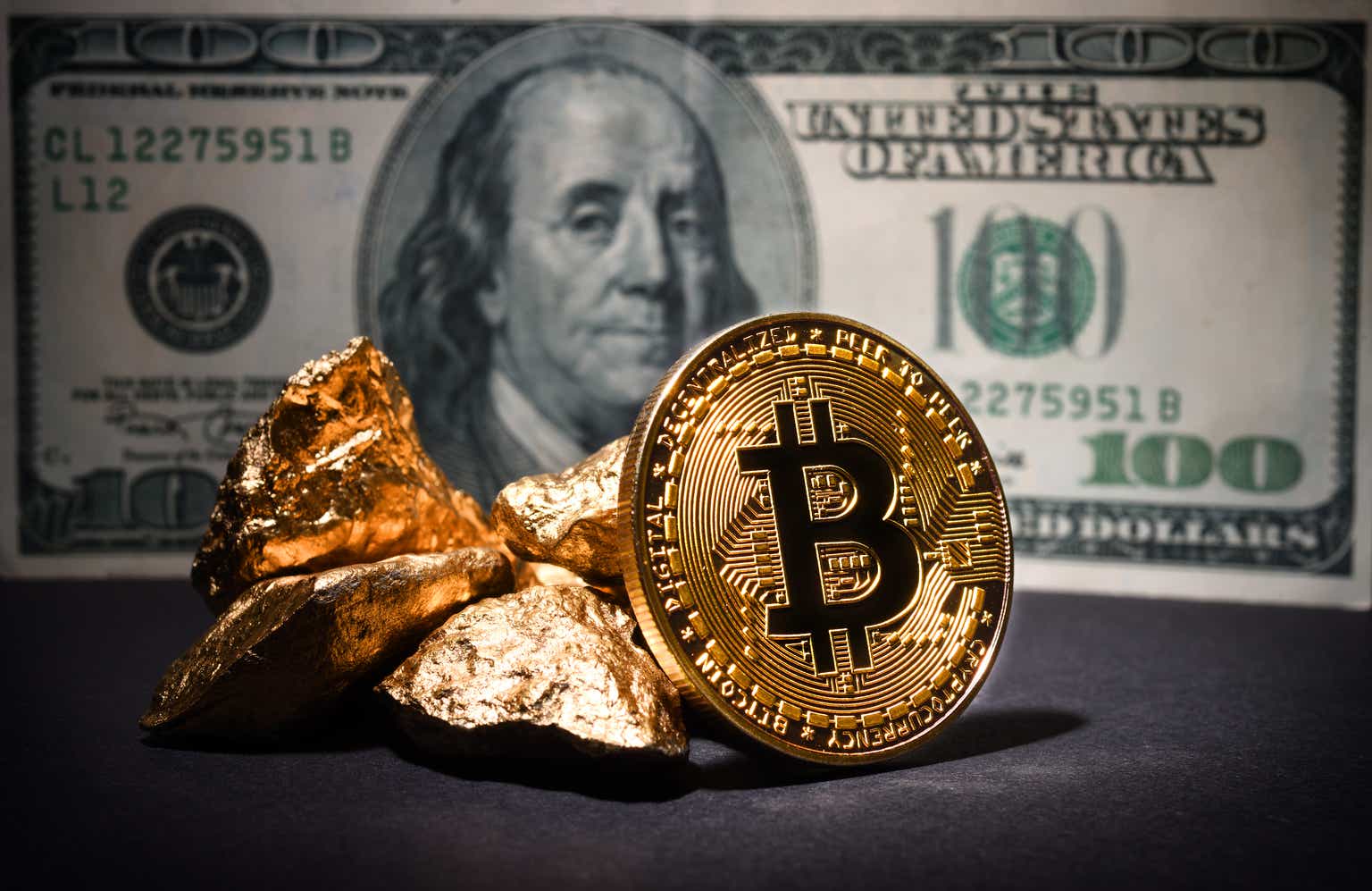A Beginner's Guide to Bitcoin | Bitcoin Is Not Hard
Bitcoin may seem complex, but this guide makes Bitcoin easy to understand. Discover the history, the technology, and the possibilities of the most successful digital currency.

The Dawn of Bitcoin
In 2008, a person or group going by the pseudonym Satoshi Nakamoto published the Bitcoin whitepaper. This document introduced both Bitcoin, and the revolutionary technology it's based on: the blockchain.
Bitcoin was the first-ever successful cryptocurrency and remains the most popular and widely used one today.
The birth of Bitcoin was fueled by a vision of financial freedom and independence from traditional banking systems. It offered a new way of transferring money, one that is decentralized, secure, and can be accessed by anyone with an internet connection.
So why is Bitcoin so important in the world of cryptocurrencies?
Firstly, it pioneered the use of blockchain technology for a decentralized monetary system.
Secondly, it has managed to remain relevant and highly valuable over a decade after its inception, showcasing its resilience and potential.
In the upcoming sections, we'll dive deeper into the workings of Bitcoin, its value, and its potential as a form of investment.
Whether you're new to this world or just looking to broaden your understanding, this is your guide to Bitcoin and the transformative technology that underpins it. Stay tuned!
Origins and Purpose of Bitcoin
Birth of Bitcoin: A Response to Financial Crisis
Bitcoin didn't appear out of thin air. Its creation was, in many ways, a response to a global financial crisis.
In 2008, banks worldwide were collapsing, economies were on the brink of recession, and public trust in financial institutions was rapidly eroding.
In the midst of this turmoil, an unknown person or group going by the name of Satoshi Nakamoto published the Bitcoin whitepaper. This groundbreaking document presented Bitcoin as a new form of digital cash, one that could operate independently of any central authority.
It proposed a system where trust between parties wasn't necessary because the system itself was inherently trustworthy.
Satoshi Nakamoto: The Enigma Behind Bitcoin
The true identity of Satoshi Nakamoto remains a mystery. Despite various attempts to uncover who Nakamoto might be, the creator(s) of Bitcoin have stayed anonymous, adding to the intrigue surrounding Bitcoin's story.
What we do know is that Nakamoto's vision has given birth to a global phenomenon that challenges traditional financial norms.
Bitcoin's Legal Status: A Global Overview
While we'd love to tell you that Bitcoin is universally accepted, the truth is that its legal status varies greatly around the world.
In some countries, like Japan and the U.S., Bitcoin is either already regulated or is in the process of being recognized.

In others, it's either partially restricted or outright banned. It's important to research and understand the legalities of Bitcoin in your specific location before diving into the world of cryptocurrencies.
The CEO of the world's biggest money manager BlackRock, who manages nearly $10 Trillion USDs worth of assets, recently called bitcoin as an "International Asset."
#Bitcoin is an International Asset. - Larry Fink, BlackRock CEO pic.twitter.com/WIVKITXYPj
— Michael Saylor⚡️ (@saylor) July 5, 2023
Bitcoin's Evolution: From Digital Cash to Digital Gold
When Bitcoin was first introduced, its primary purpose was to function as a peer-to-peer electronic cash system. The aim was to create a system where people could send money directly to each other without needing a middleman like a bank or payment processor.
However, over time, Bitcoin's role has evolved. With its capped supply of 21 million bitcoins and its decentralized nature, it started being likened to digital gold. Many now see Bitcoin as a store of value - something you hold onto with the expectation that its value will grow over time.

This shift in perception doesn't mean Bitcoin has failed in its original purpose. On the contrary, it's an indicator of Bitcoin's flexibility and adaptability. The narrative can and will continue to evolve as adoption grows and new use cases emerge.
In the next section, we'll be discussing the nuts and bolts of Bitcoin: how it works, how new bitcoins are created, and how transactions are processed. Stick around to delve further into the fascinating world of Bitcoin.
Understanding How Bitcoin Works
The Creation of Bitcoin: What is Mining?
Bitcoin, unlike traditional currency, isn't printed by a central bank. Instead, it's "mined" using computer processing power in a decentralized network. This process is called Bitcoin mining.
To put it simply, mining involves solving complex mathematical problems that validate transactions on the Bitcoin network. These transactions are then added to a public ledger called the blockchain. As a reward for contributing their computational power to maintain and secure the network, miners earn new bitcoins.
Bitcoin Transactions: How Do They Work?
The mechanics of a Bitcoin transaction are both straightforward and complex. At a basic level, if you want to send Bitcoin to someone else, you need two things: a Bitcoin address and a private key.
A Bitcoin address is like an email address. It's a unique identifier that people can use to send you bitcoins. A private key, on the other hand, is like the password to your email account. It's a secret piece of data that proves your right to spend bitcoins from a specific wallet.
When you send Bitcoin, you essentially broadcast to the network that you're transferring ownership of some bitcoins to a new address. These transactions are grouped into blocks by miners and added to the blockchain in roughly ten-minute intervals.
Who Controls Bitcoin?
This is one of the most revolutionary aspects of Bitcoin: No single entity controls it. Bitcoin operates on a decentralized network, which means its operation depends on a community of miners, developers, and users.
Miners process transactions and secure the network using their computational power.
Developers work on Bitcoin's open-source code to fix bugs, improve the system, and implement changes proposed by the Bitcoin community.
And users, of course, drive demand for Bitcoin by using it.
While it may seem disconcerting to trust your money to a system without a central authority, the beauty of Bitcoin lies in its transparency and its resilience. Every transaction is open for verification, and the system is secured by the collective power of its participants.
In our next segment, we will discuss how to get started with Bitcoin - from setting up your first wallet to making your first transaction. Stay tuned!
The Price of Bitcoin
The Current Price and Its Fluctuation
As of today, the price of one bitcoin, bitcoin total market cap, and volume traded in the last 24 hours are displayed below:
But unlike traditional currencies, Bitcoin's value can be quite volatile.
One of the primary reasons is that it's still relatively new, and some people aren't sure what to make of it. Its value is largely driven by supply and demand - the more people want to buy Bitcoin, the higher its price goes.
Conversely, if more people want to sell, the price drops.
Many factors can impact Bitcoin's price. These include technological changes, market supply and demand, regulatory news, and macroeconomic factors.
What Impacts Bitcoin's Price?
Interestingly, because Bitcoin is a global currency, events in one country can have a knock-on effect on the price of Bitcoin worldwide. For example, regulatory changes in a major Bitcoin market like the US or China can cause price fluctuations.
How to Use Bitcoin
Buying and Selling Bitcoin: A Step-by-Step Guide
1. Set Up a Wallet: The first step to owning Bitcoin is setting up a Bitcoin wallet. This is a digital wallet where you can store, send, and receive Bitcoin.
2. Find a Bitcoin Exchange: Once you have a wallet, you need to find a Bitcoin exchange. This is a platform where you can buy and sell Bitcoin using your local currency.
3. Buy Bitcoin: On the exchange, you can select how much Bitcoin you want to buy and complete the transaction. The Bitcoin will then be sent to your wallet.
4. Selling Bitcoin: Selling Bitcoin is as easy as buying it. On the exchange, you select how much Bitcoin you want to sell, and once the transaction is completed, the funds are transferred to your account.
Safety and Secure Handling of Bitcoin Transactions
Bitcoin transactions are secure by design thanks to the blockchain. However, the security of your Bitcoin also depends on how you manage your wallet.
It's crucial to keep your wallet secure because once a transaction is made, it cannot be reversed.
To ensure this, always keep your wallet's private key private and use wallets from reputable sources.
How to Earn Bitcoin
Beyond buying Bitcoin, you can also earn it!
Some people earn Bitcoin through mining, although this requires a substantial investment in hardware and electricity.
Additionally, some companies and platforms pay their users in Bitcoin for performing certain tasks or services.
Practical Uses of Bitcoin in Everyday Life
Despite what some might think, Bitcoin isn't just an investment asset. It's a fully functional currency.
You can use Bitcoin to buy goods and services online and in-store where Bitcoin is accepted. Some people use Bitcoin to send money across borders without dealing with traditional banking systems. Others hold Bitcoin as a form of "digital gold" - a store of value in times of economic uncertainty.
According to research published in June 2022:
- Approximately 15,174 businesses worldwide accept Bitcoin, with around 2,300 of those businesses operating in the US.
- There are 36,659 Bitcoin ATMs available in the U.S., as of April 2022.
- As of 2020, 28% of American small businesses accept cryptocurrency as payment.
- As of May 2022, there were roughly 260,000 Bitcoin transactions per day in the U.S.
- Each day there’s over $1 million spent on goods and services with Bitcoin in the U.S.
- Up to 40% customers who pay with Bitcoin are new customers who spend twice as much money as credit card users.
In the end, Bitcoin is a versatile and potent financial tool. Understanding its value and learning to use it effectively can open up new opportunities in the world of finance and beyond.
Bitcoin vs Other Cryptocurrencies
Existence of Other Cryptocurrencies
Beyond Bitcoin, thousands of other cryptocurrencies (or "altcoins") exist in the market today.
These range from major players like Ethereum and Ripple to smaller, niche currencies.
Each one claims to bring something unique to the table, whether it's faster transaction times, smart contract capabilities, privacy improvements, or more.
Bitcoin's Unique Features
However, Bitcoin, as the first cryptocurrency, holds a unique position in this ecosystem.
Its decentralized nature, limited supply, and robust security have set the standard for other cryptocurrencies.
The very concept of blockchain technology — a decentralized, public ledger of all transactions — was introduced by Bitcoin and has been emulated by most other cryptocurrencies.
Why Bitcoin's Blockchain Can Accomplish What Others Claim to Do
Bitcoin's blockchain can accomplish what other cryptocurrencies claim to do.
For instance, many altcoins claim to offer faster transactions or more complex features like smart contracts.
However, with ongoing development and improvements to Bitcoin's network (like the Lightning Network for faster transactions or sidechains for smart contracts), Bitcoin can, and is, evolving to offer similar features while maintaining its inherent strengths.
Securely Storing Bitcoin and Implications of Losing It
Storing Bitcoin securely is paramount, given that it's a digital asset.
The process generally involves a digital wallet, and for added security, hardware wallets can be used. They provide an extra layer of security by storing your private keys offline.
Losing Bitcoin can be disastrous as it's not like losing a credit card. If you lose access to your Bitcoin wallet, say, by losing the private keys, it's nearly impossible to retrieve your Bitcoin.
This degree of responsibility and sovereignty is one key area where Bitcoin differs from other cryptocurrencies and traditional financial systems.
Environmental Impacts of Bitcoin
There's been a lot of debate about the environmental impact of Bitcoin, particularly concerning its energy consumption due to mining.
Indeed, Bitcoin mining consumes significant energy, but it's also essential to note that the majority of Bitcoin mining uses renewable energy or energy that would otherwise be wasted.
Compared to other cryptocurrencies, Bitcoin's energy consumption is higher, but it's also accomplishing something fundamentally different.
It's securing a decentralized, permissionless, globally accessible monetary network, which no other cryptocurrency or traditional financial system can claim.
In fact, some estimates suggest that by December 2024, the Bitcoin network could reduce more emissions than the energy sources it uses.
Bitcoin's Effect on the Economy
Bitcoin is much more than just a digital currency; it's a whole new kind of financial system. This has significant implications for the economy. For one, it provides a form of "digital gold" - a store of value that isn't tied to the traditional banking system.
More importantly, Bitcoin opens up the possibility of a truly global economy. By providing a universal, decentralized currency, Bitcoin has the potential to streamline international trade and reduce dependency on any single country's economy.
In summary, while many cryptocurrencies exist today, Bitcoin stands out due to its unique features, flexibility, and potential economic impact. As such, it remains the most promising and significant cryptocurrency in the digital age.
Investing in Bitcoin
Risks and Rewards of Investing in Bitcoin
Like any investment, Bitcoin comes with its own set of risks and rewards. The most evident reward is the potential for high returns.
Over the past decade, Bitcoin has been the best-performing assets globally since its launch.
#Bitcoin is for Winners. pic.twitter.com/kTKUpRwyTs
— Michael Saylor⚡️ (@saylor) July 4, 2023
However, it's essential to balance this with the reality that Bitcoin is highly volatile. Prices can swing dramatically in a short period, which means investors could also face significant losses.
Another reward is that Bitcoin provides a hedge against inflation. Because there is a finite amount of Bitcoin that will ever exist, it's resistant to the inflationary policies that can devalue fiat currencies.
However, this doesn't mean Bitcoin is risk-free.
As a relatively new and still-evolving asset class, regulatory uncertainties, technological risks, and market manipulation are potential risks that Bitcoin investors must consider.
Comparing Bitcoin to Other Investments
Bitcoin is often compared to gold as a 'digital gold' because of its store of value properties and its potential as a hedge against economic uncertainty.
However, unlike traditional investments, like stocks and bonds, which are tied to the performance of a company or government, Bitcoin's price is driven by supply and demand dynamics within its network.
Furthermore, Bitcoin's returns have shown low correlation to traditional asset classes, making it a useful tool for diversification in an investment portfolio.
It should be noted, however, that because of its high volatility, investing in Bitcoin should be approached with caution and as part of a diversified portfolio strategy.
The Future of Bitcoin and Its Role in the Financial World
The future of Bitcoin is a hot topic of debate.
On one hand, believers in the technology see Bitcoin becoming a fundamental pillar of a new decentralized financial world, where it could serve as a global reserve currency.
On the other hand, skeptics point to regulatory, environmental, and technological challenges that could limit Bitcoin's growth and acceptance.
As a Bitcoin maximalists, we lean towards the former view. We see Bitcoin's potential to revolutionize the way we think about and use money. Its decentralized, peer-to-peer nature cuts out the need for intermediaries, which could make the financial system more efficient, inclusive, and resilient.
In Summary
As we wrap up this discussion, one thing is clear: Bitcoin, as the pioneer and the most successful implementation of cryptocurrency, holds significant value and potential in the digital economy.
Bitcoin is more than just a speculative asset; it's a groundbreaking technology that is redefining what we consider as 'money.'
It's a decentralized, peer-to-peer financial system that operates independently of central banks or governments. Its supply is finite, providing a safeguard against inflation.
Transactions made with Bitcoin are transparent, immutable, and secured by advanced cryptography, thereby ensuring trust in the system. Its price, while highly volatile, has shown remarkable growth over the years, making it an attractive investment for those willing to accept the risk.
While Bitcoin does face challenges, such as regulatory uncertainties and environmental concerns, the technology and the community behind it continue to evolve and address these issues.
We believe in the robustness of Bitcoin's blockchain and its ability to bring about the same, if not more, functionalities that other cryptocurrencies claim to offer.
Nevertheless, diving into the world of Bitcoin is a decision that should be made carefully. It requires a clear understanding of the technology, the market dynamics, and one's own risk tolerance. As with any other investment, due diligence is a must.
We encourage you to continue exploring, learning about, and, if you feel so inclined, participating in the Bitcoin ecosystem. Remember, we're in the early days of what could be a significant shift in our financial system. Bitcoin is leading that charge, and it's an exciting journey to be a part of.
Happy Bitcoin journey!
If you've learned something new about Bitcoin today, I have a small favor to ask: please share this article on your social media. By doing so, you'll help us educate more people about money and Bitcoin, and enable us to continue providing insights into this transformative technology.
The more we share, the closer we come to a future where money works better for all of us.


